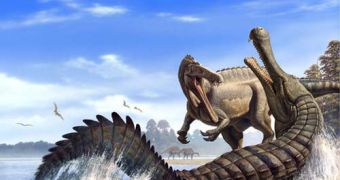A new paper published in the journal Proceedings of the Royal Society B this September 11 sheds new light on how crocodiles that roamed the Earth millions of years ago managed to survive despite the fact that the world they lived in was one dominated by dinosaurs.
Researchers explain that, unlike present-day crocodiles, ancient ones did not inhabit freshwater habitats alone.
On the contrary, some of them were able to live out of the water for considerable periods.
In fact, specialists say that, according to the evidence at hand, they probably ran around on land much like dogs do nowadays.
Those that did not evolve to live on land learned how to survive in the open ocean.
Researchers suspect that the feeding behavior of these ocean dwellers was not very different from the one displayed by today's killed whales.
“They were very different creatures to the ones we are familiar with today, much more diverse and, as this research shows, their ability to adapt was quite remarkable,” specialist Tom Stubbs at the University of Bristol explains, as cited by EurekAlert.
“Their evolution and anatomical variation during the Mesozoic Era was exceptional. They evolved lifestyles and feeding ecologies unlike anything seen today,” he adds.
An analysis of about 100 fossilized crocodile jaws remains supports the theory that, at the time when they were left with no choice except live alongside dinosaurs (i.e. between 235 million and 65 million years ago), crocodiles came to be surprisingly diverse.
Thus, during the Jurassic, crocodiles ended up sporting fairly long jaws that allowed them to hunt fish and other agile prey in the open ocean.
During the Cretaceous, they evolved jaws that made them quite effective in taking down and eating land animals.
Specialists suspect that this stunning ability to adapt to their surroundings is what ensured the crocodiles' long-term survival.
“Our results show that the ability to exploit a variety of different food resources and habitats, by evolving many different jaw shapes, was crucial to recovering from the end-Triassic extinction and most likely contributed to the success of Mesozoic crocodiles living in the shadow of the dinosaurs,” Dr. Stephanie Pierce from The Royal Veterinary College says.

 14 DAY TRIAL //
14 DAY TRIAL //